
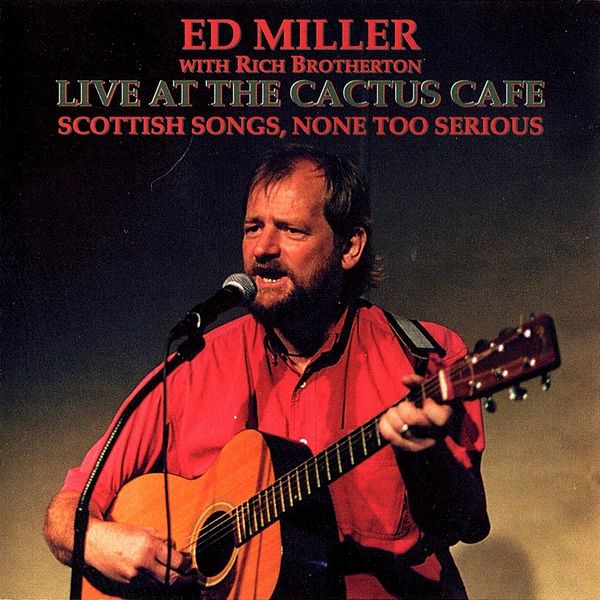 |
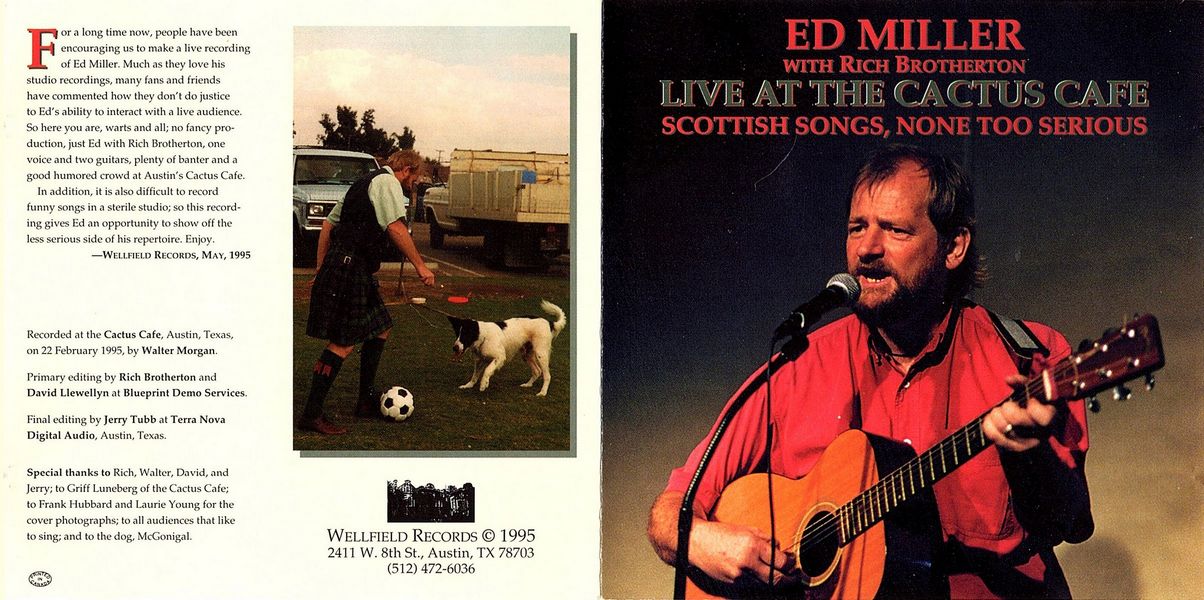
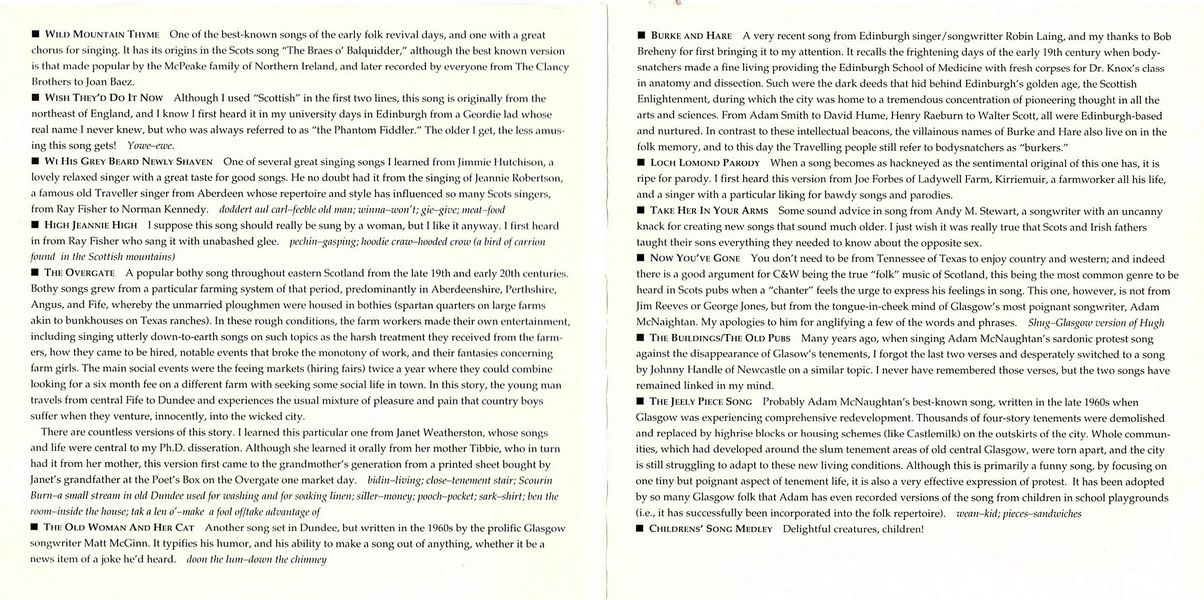 |
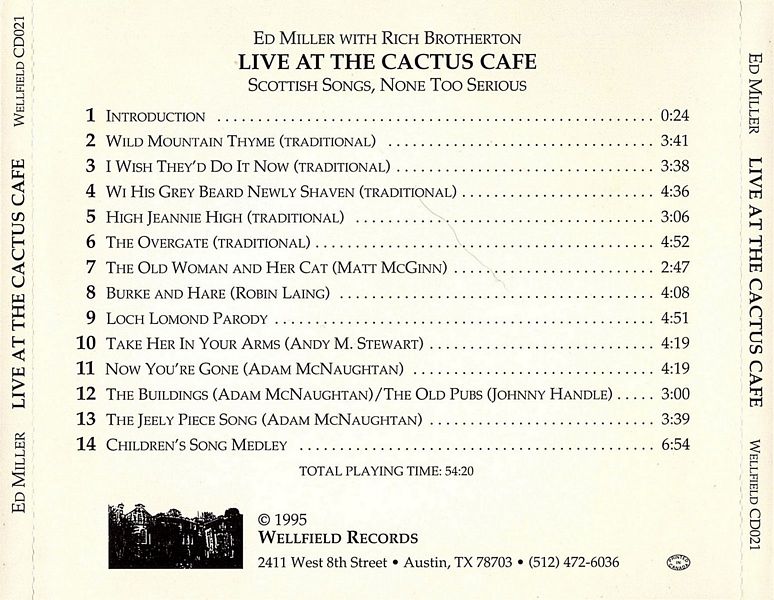
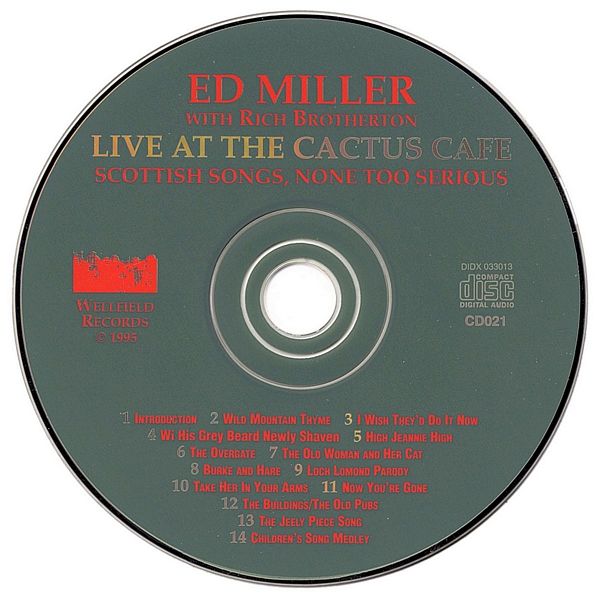 |
Sleeve Notes
For a long time now, people have been encouraging us to make a live recording of Ed Miller. Much as they love his studio recordings, many fans and friends have commented how they don't do justice to Ed's ability to interact with a live audience. So here you are, warts and all; no fancy production, just Ed with Rich Brotherton, one voice and two guitars, plenty of banter and a good humored crowd at Austin's Cactus Cafe.
In addition, it is also difficult to record funny songs in a sterile studio; so this recording gives Ed an opportunity to show off the less serious side of his repertoire. Enjoy.
Wellfield Records, May, 1995
Wild Mountain Thyme — One of the best-known songs of the early folk revival days, and one with a great chorus for singing. It has its origins in the Scots song "The Braes o' Balquidder," although the best known version is that made popular by the McPeake family of Northern Ireland, and later recorded by everyone from The Clancy Brothers to Joan Baez.
Wish They'd Do It Now — Although I used "Scottish" in the first two lines, this song is originally from the northeast of England, and I know I first heard it in my university days in Edinburgh from a Geordie lad whose real name I never knew, but who was always referred to as "the Phantom Fiddler." The older I get, the less amusing this song gets!
Yowe — ewe.
Wi His Grey Beard Newly Shaven — One of several great singing songs I learned from Jimmie Hutchison, a lovely relaxed singer with a great taste for good songs. He no doubt had it from the singing of Jeannie Robertson, a famous old Traveller singer from Aberdeen whose repertoire and style has influenced so many Scots singers, from Ray Fisher to Norman Kennedy.
doddert aul carl — feeble old wan; winna — won't; gie — give; meat — food
High Jeannie High — I suppose this song should really be sung by a woman, but I like it anyway. I first heard in from Ray Fisher who sang it with unabashed glee.
pechin — gasping; hoodie craw — hooded crow (a bird of carrion found in the Scottish mountains)
The Overgate — A popular bothy song throughout eastern Scotland from the late 19th and early 20th centuries. Bothy songs grew from a particular farming system of that period, predominantly in Aberdeenshire, Perthshire, Angus, and Fife, whereby the unmarried ploughmen were housed in bothies (spartan quarters on large farms akin to bunkhouses on Texas ranches). In these rough conditions, the farm workers made their own entertainment, including singing utterly down-to-earth songs on such topics as the harsh treatment they received from the farmers, how they came to be hired, notable events that broke the monotony of work, and their fantasies concerning farm girls. The main social events were the feeing markets (hiring fairs) twice a year where they could combine looking for a six month fee on a different farm with seeking some social life in town. In this story, the young man travels from central Fife to Dundee and experiences the usual mixture of pleasure and pain that country boys suffer when they venture, innocently, into the wicked city.
There are countless versions of this story. I learned this particular one from Janet Weatherston, whose songs and life were central to my Ph.D. dissertation. Although she learned it orally from her mother Tibbie, who in turn had it from her mother, this version first came to the grandmother's generation from a printed sheet bought by Janet's grandfather at the Poet's Box on the Overgate one market day.
bidin — living; close — tenement stair; Scourin Burn — a small stream in old Dundee used for washing and for soaking linen; siller — money; pooch — pocket; sark — shirt; ben the room — inside the house; tak a len o' — make a fool of/take advantage of
The Old Woman And Her Cat — Another song set in Dundee, but written in the 1960s by the prolific Glasgow songwriter Matt McGinn. It typifies his humor, and his ability to make a song out of anything, whether it be a news item of a joke he'd heard.
doon the lum — down the chimney
Burke and Hare — A very recent song from Edinburgh singer/songwritter Robin Laing, and my thanks to Bob Breheny for first bringing it to my attention. It recalls the frightening days of the early 19th century when body-snatchers made a fine living providing the Edinburgh School of Medicine with fresh corpses for Dr. Knox's class in anatomy and dissection. Such were the dark deeds that hid behind Edinburgh's golden age, the Scottish Enlightenment, during which the city was home to a tremendous concentration of pioneering thought in all the arts and sciences. From Adam Smith to David Hume, Henry Raeburn to Walter Scott, all were Edinburgh-based and nurtured. In contrast to these intellectual beacons, the villainous names of Burke and Hare also live on in the folk memory, and to this day the Travelling people still refer to bodysnatchers as "burkers."
Loch Lomond — Parody When a song becomes as hackneyed as the sentimental original of this one has, it is ripe for parody. I first heard this version from Joe Forbes of Ladywell Farm, Kirriemuir, a farmworker all his life, and a singer with a particular liking for bawdy songs and parodies.
Take Her In Your Arms — Some sound advice in song from Andy M. Stewart, a songwriter with an uncanny knack for creating new songs that sound much older. I just wish it was really true that Scots and Irish fathers taught their sons everything they needed to know about the opposite sex.
Now You've Gone — You don't need to be from Tennessee of Texas to enjoy country and western; and indeed there is a good argument for C&W being the true "folk" music of Scotland, this being the most common genre to be heard in Scots pubs when a "chanter" feels the urge to express his feelings in song. This one, however, is not from Jim Reeves or George Jones, but from the tongue-in-cheek mind of Glasgow's most poignant songwriter, Adam McNaightan. My apologies to him for anglifying a few of the words and phrases.
Shug — Glasgow version of Hugh
The Buildings/The Old Pubs — Many years ago, when singing Adam McNaughtan's sardonic protest song against the disappearance of Glasow's tenements, I forgot the last two verses and desperately switched to a song by Johnny Handle of Newcastle on a similar topic. I never have remembered those verses, but the two songs have remained linked in my mind.
The Jeely Piece Song — Probably Adam McNaughtan's best-known song, written in the late 1960s when Glasgow was experiencing comprehensive redevelopment. Thousands of four-story tenements were demolished and replaced by highrise blocks or housing schemes (like Castlemilk) on the outskirts of the city. Whole communities, which had developed around the slum tenement areas of old central Glasgow, were torn apart, and the city is still struggling to adapt to these new living conditions. Although this is primarily a funny song, by focusing on one tiny but poignant aspect of tenement life, it is also a very effective expression of protest. It has been adopted by so many Glasgow folk that Adam has even recorded versions of the song from children in school playgrounds (i.e., it has successfully been incorporated into the folk repertoire).
wean — kid; pieces — sandwiches
Childrens' Song Medley — Delightful creatures, children!